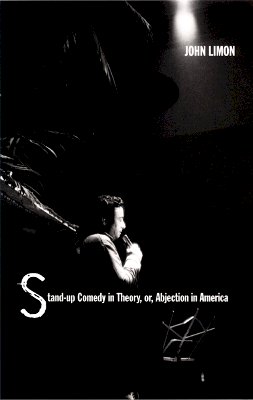
Stock image for illustration purposes only - book cover, edition or condition may vary.
Stand-Up Comedy in Theory, or, Abjection in America
John Limon
€ 39.93
FREE Delivery in Ireland
Description for Stand-Up Comedy in Theory, or, Abjection in America
Paperback. Presents the study of stand-up comedy as a form of art. This title appreciates and analyses the specific practice of stand-up itself, moving beyond theories of the joke, of the comic, and of comedy in general to read stand-up through the lens of literary and cultural theory. Series: New Americanists. Num Pages: 160 pages, notes. BIC Classification: 1KBB; JFCA. Category: (P) Professional & Vocational. Dimension: 5969 x 3887 x 12. Weight in Grams: 263.
Stand-Up Comedy in Theory, or, Abjection in America is the first study of stand-up comedy as a form of art. John Limon appreciates and analyzes the specific practice of stand-up itself, moving beyond theories of the joke, of the comic, and of comedy in general to read stand-up through the lens of literary and cultural theory. Limon argues that stand-up is an artform best defined by its fascination with the abject, Julia Kristeva’s term for those aspects of oneself that are obnoxious to one’s sense of identity but that are nevertheless—like blood, feces, or urine—impossible to jettison once and for all. All of a comedian’s life, Limon asserts, is abject in this sense.
Limon begins with stand-up comics in the 1950s and 1960s—Lenny Bruce, Carl Reiner, Mel Brooks, Mike Nichols, Elaine May—when the norm of the profession was the Jewish, male, heterosexual comedian. He then moves toward the present with analyses of David Letterman, Richard Pryor, Ellen DeGeneres, and Paula Poundstone. Limon incorporates feminist, race, and queer theories to argue that the “comedification” of America—stand-up comedy’s escape from its narrow origins—involves the repossession by black, female, queer, and Protestant comedians of what was black, female, queer, yet suburbanizing in Jewish, male, heterosexual comedy. Limon’s formal definition of stand-up as abject art thus hinges on his claim that the great American comedians of the 1950s and 1960s located their comedy at the place (which would have been conceived in 1960 as a location between New York City or Chicago and their suburbs) where body is thrown off for the mind and materiality is thrown off for abstraction—at the place, that is, where American abjection has always found its home.
Limon begins with stand-up comics in the 1950s and 1960s—Lenny Bruce, Carl Reiner, Mel Brooks, Mike Nichols, Elaine May—when the norm of the profession was the Jewish, male, heterosexual comedian. He then moves toward the present with analyses of David Letterman, Richard Pryor, Ellen DeGeneres, and Paula Poundstone. Limon incorporates feminist, race, and queer theories to argue that the “comedification” of America—stand-up comedy’s escape from its narrow origins—involves the repossession by black, female, queer, and Protestant comedians of what was black, female, queer, yet suburbanizing in Jewish, male, heterosexual comedy. Limon’s formal definition of stand-up as abject art thus hinges on his claim that the great American comedians of the 1950s and 1960s located their comedy at the place (which would have been conceived in 1960 as a location between New York City or Chicago and their suburbs) where body is thrown off for the mind and materiality is thrown off for abstraction—at the place, that is, where American abjection has always found its home.
Product Details
Format
Paperback
Publication date
2000
Publisher
Duke University Press United States
Number of pages
160
Condition
New
Series
New Americanists
Number of Pages
160
Place of Publication
North Carolina, United States
ISBN
9780822325468
SKU
V9780822325468
Shipping Time
Usually ships in 7 to 11 working days
Ref
99-1
About John Limon
John Limon is Professor of English at Williams College. He is the author of The Place of Fiction in the Time of Science and Writing after War.
Reviews for Stand-Up Comedy in Theory, or, Abjection in America
“John Limon’s book opens up exciting new possibilities in cultural studies. Stand-up comedy—manic, smutty, abusive, improvisatory—has up to now evaded academic critics, as if its pleasures were too volatile for examination. Limon carries off the feat—rarely achieved by analysts of humour—of taking comedy seriously without spoiling the jokes.”—Maud Ellmann, University of Cambridge “Limon’s close readings of specific comic performances are masterful, making vivid and compelling his larger and more abstract arguments about the ways that comedy allows us to deal with the process of cultural abjection. Speaking as someone who has taught and written about the American comic tradition for more than a decade, I can honestly say I learned something significant about each of the performers he examines.”—Henry Jenkins, author of Classical Hollywood Comedy
